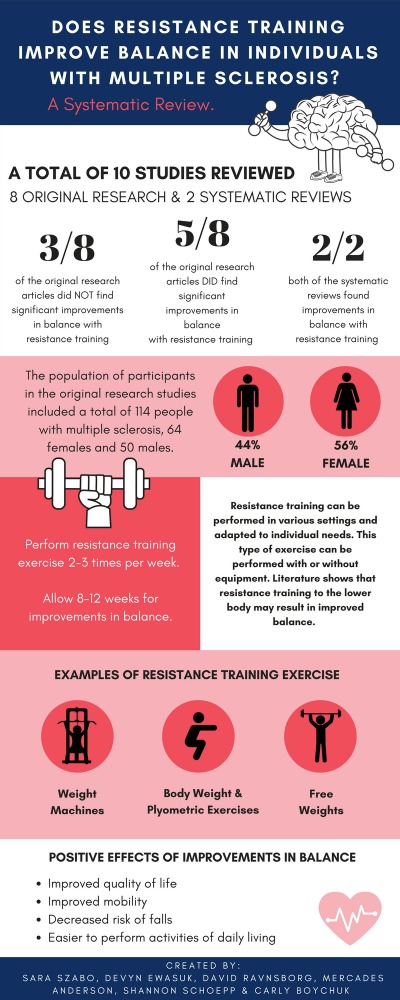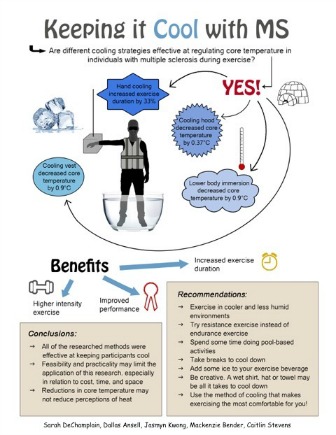Working with community partners, students in KIN 372: Neuroscience Considerations for Adapted Physical Activity have created infographic pamphlets for those living with multiple sclerosis. The project is all part of the Community Service Learning (CSL) program offered through various courses at the University of Alberta.
CSL provides students the opportunity to work and make a difference with a local community group, while reflecting and putting their experiences in context within a university course. These community partnerships provide opportunities for students to gain valuable experience, and to contribute and increase their awareness of the social and political life of their community.
KIN 372 - a course offered to Bachelor of Kinesiology students within the Faculty of Physical Education and Recreation - was developed with the CSL component in mind. Associate professor Kelvin Jones and faculty lecturer Joanna Auger wanted to provide students the opportunity to use critical thinking to meet and interact with community members that are living with particular neurologic impairments such as multiple sclerosis, Parkinson's disease, and spinal cord Injury.
The students were introduced to four community partners to work on their CSL projects with - Northern Alberta MS Clinic, Parkinson's Alberta, Movement Disorders & Deep Brain Stimulation Clinic and Spinal Cord Injury Alberta. Using their knowledge on qualitative research methods such as semi-structured interviews, the students engaged with these community partners through focus groups.
Community members were asked questions about exercise, shared experiences, and expressed concerns or hesitations about exercising with their condition. Based on each student's focus group discussion, they were to come up with a community driven research question, work with their instructors and completed a systematic review of the current literature. These findings were then shared with the KIN 372 class in a presentation and with the community members through various forms of deliverables.
The two groups who worked directly with the Northern Alberta MS Clinic chose to deliver their research and give back to the community through info graphics/pamphlets.
The first student team used their focus group to discuss the topic of exercise and physical activity as it related to individuals living with MS. Their infographic illustrates and answers the research question, "Does resistance training improve balance in individuals with Multiple Sclerosis?"
"We witnessed how research can be directly applied within the community and positively influence the lives of individuals experiencing chronic disease. Personally, I think that having the opportunity to apply the knowledge we have gained over the past few years while contributing to our local community reinforced how valuable our education is and the difference we can make in the lives of others," says Sara Szabo, KIN 372 Student.
The second student team held a focus group with three members with MS to discuss physiological symptoms that present barriers to physical activity. Through their discussions they came up with a research question relevant to the community: "Are different cooling strategies effective at regulating core temperature in individuals with multiple sclerosis during exercise?"
The impact of the KIN 372 CSL project was felt by those working closely with the MS community.
"To have university students working and collaborating with people who have multiple sclerosis, was eye-opening and fun for both groups," says Penny Smyth, Neurologist, Northern Alberta MS Clinic and associate professor, Department of Medicine, University of Alberta. "Together they brainstormed questions about challenges and benefits of exercise in MS, and then searched for answers. To produce concrete outcomes of the community outreach education project in exercise while living with MS was empowering for all concerned. The final products that could be disseminated to help people living with multiple sclerosis meant a lot to all focus group and student members on the projects."
The subversive goal of introducing the CSL project to KIN 372 was to have students learn a process for interacting with individuals with chronic neurologic conditions, knowing what guidelines currently exist, but in the absence of specifics, how to make evidence-based decisions and develop a sense of personal efficacy when it comes to working with these individuals.
"We need more exercise physiologists that are trained and willing to work in our communities with individuals that have neurologic conditions," says associate professor Kelvin Jones, Faculty of Physical Education and Recreation "Typically, Kinesiology students assume that these individuals are the responsibility of other health care professionals, e.g. physiotherapists. We want to build their competence so that they can sit around the table with multidisciplinary teams and contribute to the discussion about exercise for clients with neurologic conditions."

